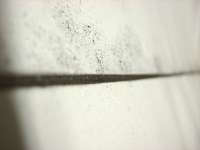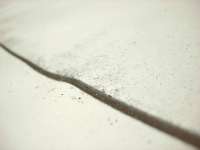AN ENTROPIC LINE BECOMES HOLONIC SPRAY (Highlights from my notes on the subject) Jane Boyer © 2011
Contrary to Mondrian’s idea of the immutable as expressed by two parallel lines, I see them as a perfectly ripe relationship for transference and the mutable state of tense energy passing between those parallel lines.
Transference is the witness to the expenditure of energy.
If the universe is perfect and we are part of the universe then our imperfection is absorbed, contained and allowed by the perfect universe. This relationship or duality is a state of grace.
There is no release from the corporeal or temporal reality of a drawn, measured or applied line. The body exerts its force on a drawn line; a measured line is subject to the accuracy or inaccuracies of the tool, the topography of a ground, any ground, interferes with the application of the media used to make a line. A line is the manifestation of the passage of time The form of line is mutable because of the natural flaws or imperfections inherent in any attempt to make a line. Any line as it is being constructed, passing on a trajectory through time and space, interacts with the unknown. Each millisecond of advancement forward is an encounter with unknown space. And this encounter or interaction with the unknown is another way of saying ‘chance’. Chance makes all things mutable and chance is active in all creativity.
Just as perpetuity is the opposite to entropic loss of energy in science, I see continuity as the opposite of entropic depletion in art. By continuity I mean a continuance through transference, mutability and the unveiling of constituent parts.
I am fascinated by the natural flaw, the inherent irregularity which is imperfection. My interest is in exploiting imperfection which is innate and which is incontrovertible. I see chance as a compelling element of imperfection because chance happens as a result of the unknown or as randomness, both of which can be argued to be imperfect. The unknown is imperfect in two ways. First, something is hidden or unrevealed and so a perfect knowledge or understanding is not possible. Second, if the idea of the unknown is perfect in our minds, the moment the unknown becomes known is a moment of imperfection because the idea of the perfect is altered into reality. That perfect idea is no longer ideal but real, containing pros and cons within it.
AN ENTROPIC LINE BECOMES HOLONIC SPRAY (Highlights from my notes on the subject) Jane Boyer © 2011
Contrary to Mondrian’s idea of the immutable as expressed by two parallel lines, I see them as a perfectly ripe relationship for transference and the mutable state of tense energy passing between those parallel lines.
Transference is the witness to the expenditure of energy.
If the universe is perfect and we are part of the universe then our imperfection is absorbed, contained and allowed by the perfect universe. This relationship or duality is a state of grace.
There is no release from the corporeal or temporal reality of a drawn, measured or applied line. The body exerts its force on a drawn line; a measured line is subject to the accuracy or inaccuracies of the tool, the topography of a ground, any ground, interferes with the application of the media used to make a line. A line is the manifestation of the passage of time The form of line is mutable because of the natural flaws or imperfections inherent in any attempt to make a line. Any line as it is being constructed, passing on a trajectory through time and space, interacts with the unknown. Each millisecond of advancement forward is an encounter with unknown space. And this encounter or interaction with the unknown is another way of saying ‘chance’. Chance makes all things mutable and chance is active in all creativity.
Just as perpetuity is the opposite to entropic loss of energy in science, I see continuity as the opposite of entropic depletion in art. By continuity I mean a continuance through transference, mutability and the unveiling of constituent parts.
I am fascinated by the natural flaw, the inherent irregularity which is imperfection. My interest is in exploiting imperfection which is innate and which is incontrovertible. I see chance as a compelling element of imperfection because chance happens as a result of the unknown or as randomness, both of which can be argued to be imperfect. The unknown is imperfect in two ways. First, something is hidden or unrevealed and so a perfect knowledge or understanding is not possible. Second, if the idea of the unknown is perfect in our minds, the moment the unknown becomes known is a moment of imperfection because the idea of the perfect is altered into reality. That perfect idea is no longer ideal but real, containing pros and cons within it.

